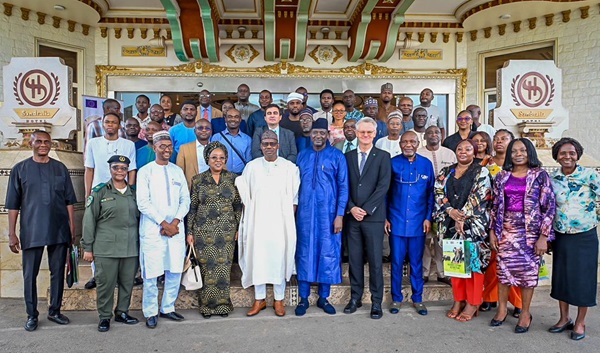
The Nigerian government has announced the launch of a National Elephant Action Plan (NEAP) aimed at preventing the extinction of the country’s elephant population and conserving its wildlife.
The initiative was unveiled by the Minister of State for Environment Iziaq Adekunle Salako in Abuja on Tuesday.
Salako described this initiative as a crucial step towards protecting Nigeria’s natural resources, including its wildlife, for the benefit of nature, humanity, and sustainable economic development. He emphasised that the National Strategy to Combat Wildlife and Forest Crime, which was recently developed, is now being operationalised. Additionally, he mentioned that the draft Bill on the Endangered Species Conservation and Protection 2024 is currently progressing through the National Assembly. The targets and indicators of the National Biodiversity Strategy and Action Plan (NBSAP) are also being aligned with the Kunming-Montreal Global Biodiversity Framework (KMGBF) as validated by relevant stakeholders.
The minister highlighted Nigeria’s cross-border efforts to conserve wildlife through international cooperation, noting that these initiatives extend beyond national borders. He pointed out that Nigeria is collaborating with other countries at sub-regional and regional levels to combat wildlife and biodiversity loss. Salako also mentioned Nigeria’s role in the Ministerial Alliance for Ambition on Nature Finance (MAANF), which aims to secure more funding for nature-based solutions, including biodiversity protection. Furthermore, he referenced the recently signed memorandum of understanding with Cameroon on Bilateral Cooperation Framework Agreements for Transboundary Ecosystem Conservation and Sustainable Management of Forest and Wildlife Resources. This agreement is intended to improve both national security and biodiversity conservation.
“Recently, a Nigerian delegation was facilitated to visit Kenya to exchange ideas and observe best practices on wildlife protection, including how to harness it for sustainable economic development,” Salako noted.
The timing of this initiative is critical, according to Salako, given the alarming decline in Nigeria’s elephant population. He explained that elephants, which are an integral part of Nigeria’s history and heritage, have suffered an 86 percent population decline over the past 30 years, with only about 400 elephants remaining as of 2021. He stressed that Nigeria’s elephant population is under severe threat, particularly the small, isolated populations of forest elephants. These elephants are believed to reproduce more slowly than savanna elephants and are even more vulnerable to poaching.
“Distinguished Ladies and Gentlemen, you will agree with me that there can be no more appropriate time for this occasion than now, considering the above worrisome revelation and the recent incidents of elephant captures and killings in some parts of the country last year. These are in addition to other numerous threats, including habitat loss, human-wildlife conflict, and poaching,” Salako stated.
The minister praised the NEAP as a timely and effective solution that aligns with President Bola Ahmed Tinubu’s priority to unlock Nigeria’s natural resources for sustainable development. He affirmed that the NEAP is designed to serve as a planning and monitoring tool for elephant conservation measures. It will also function as a framework for strategies and decision-making by relevant government institutions, donor agencies, and NGOs.
In his welcome address, the permanent secretary of the Environment Ministry, Alhaji Mahmud Kambari, emphasised that the NEAP reflects Nigeria’s dedication to safeguarding its iconic species. He noted that the comprehensive plan results from a collaborative effort that brings together government agencies, conservation organisations, local communities, and international partners to work towards a common goal. Kambari added that the launch of the NEAP reaffirms Nigeria’s commitment to a sustainable future where humans and wildlife coexist harmoniously.
Globally, there is a call to eliminate biodiversity loss by 2050 through the Kunming-Montreal Global Biodiversity Framework Agreement, to which Nigeria is a signatory. The launch of this national plan of action, sponsored by the Elephant Protection Initiative (EPI) in the United Kingdom, demonstrates Nigeria’s resolve to meet its biodiversity targets as agreed upon in the 2020 Global Convention.
The NEAP is a significant step towards reversing the decline of Nigeria’s elephant population and preserving its rich biodiversity for future generations. The initiative also underscores Nigeria’s role in global efforts to combat biodiversity loss and protect endangered species.

